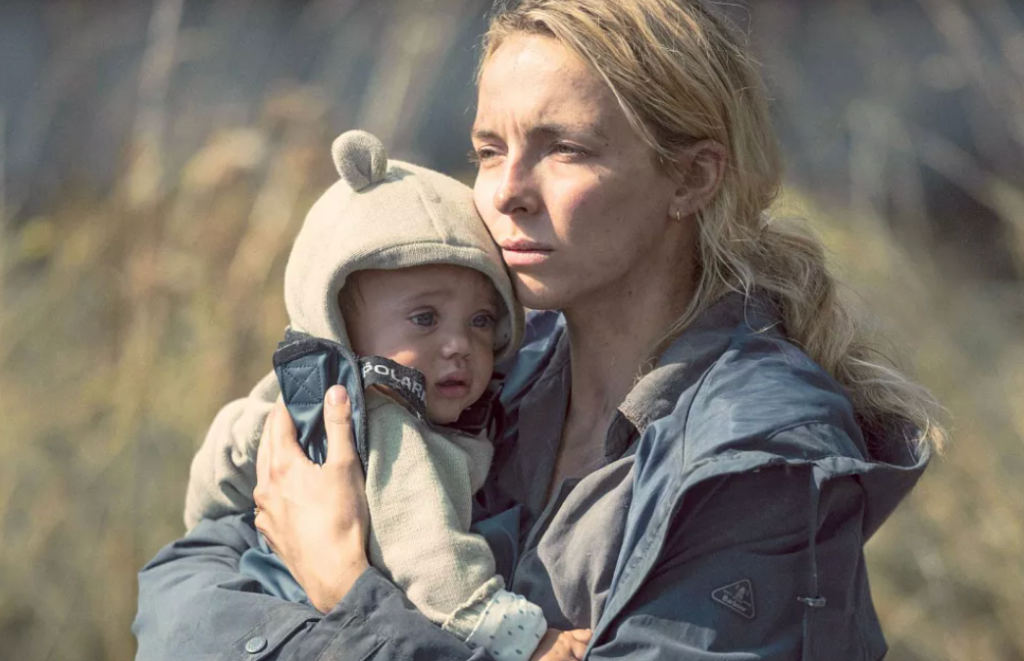
THE END WE Start From starts with the sound of rain. Insistent, drumming on the rooftops and the windows, it fills every crevice with rivulets of water. The woman (Jodie Comer) is at home; heavily pregnant. Like the weather outside, her contained waters also break; and as rivulets turn into rivers, she finds herself in a slowly flooding hospital where she gives birth. The hubby (Joel Fry) is terrified at the rapid breakdown in society; food is becoming scarce and desperate crowds have to jostle for precious food parcels. He fears for his inability to protect his wife and newborn girl.
This latest dystopian drama is all the more absorbing because of its sense of immediacy. It feels less like the fictionalized dystopian dramas that crowd our screens and more like a news item/documentary. The annual floods on TV news in the UK, are indeed the stuff of our everyday viewing. But instead of the anonymous country villages with their water-logged shops, this newscast features a half-submerged London with filth and detritus clogging the fetid waterways that have replaced streets. The scenes of crowds in vast Care Centres, guarded by army personnel, and caged behind wire fences, are like videos of the typical refugee centres we’re accustomed to seeing. This isn’t so much a work of fiction, it’s a work of warning. There’s no hysteria, no overwrought drama (other than the annoying sound-track), just a matter-of-fact glimpse into the inevitable result of our collapsing climate and the melting of glaciers. This is London in five, maybe ten years.
Sell your cars, buy a boat!
And that’s just the background to the story. It’s a story of survival; of a young mother’s strength in protecting her baby, as she eludes dangers, forges friendships and searches for an exit strategy; an escape from Armageddon. The woman is unnamed; she is ‘The Mother’. Her mission is the archetypal mother’s mission: to care and protect her offspring. But the further she walks/rides/boats away from danger, the more she realises that running away (how do you run away from climate collapse?) offers not escape, simply escapism. As the title suggests, her journey, as a protector, must return her to where it all began (for her), where she can be a part of the repair, heal and protect process, not simply one of those who, like most of the men, flee.
It’s a movie very heavily weighted from a perspective of female strength and resilience. We meet a number of fearless women, including another young mother with whom The Mother makes a strong bond (Katherine Waterstone). The men are all pretty pathetic: they run away, sink into despair or fight with each other.
But director Mahalia Belo’s movie is no anti-male creed. It’s a heavily symbolic movie about the earth. As we noted, we are first introduced to The -pregnant-Mother when her waters along with the flood’s break. No coincidence that! Such parallels punctuate the story-line. At one point, we see The Mother strip off and plunge into a dark and unwelcoming sea where she immerses herself into its cold and turbulent waters. We see her scavenging road-kill (a dead rabbit) and cooking it next to some sort of raptor, an eagle, maybe which is eating the discarded skin. She is the flood. She is the sea. She is the eagle. The Mother is Gaia. She is Mother Earth. She, the earth, damaged, must protect her offspring and heal herself. This is the lens that, for me anyway, adds a heady depth to the movie.
Fortunately you don’t need all this deconstruction to enjoy or appreciate this movie. It exists wonderfully well simply as the picaresque journey of a mother and child in a destroyed world. The acting talent is formidable. Jodie Comer (Killing Eve) is compellingly believable as she makes no outer show of projecting what is clearly, her extraordinary inner strength. She’s just doing what any mother would do. Her friend, O (the Katherine Waterston character), is the more affectionate, down to earth side of The Woman; a happy companion and anti-dote to The Mother’s brooding sense of existential dread. And there are some nice cameos from Benedict Cumberbatch and Mark Strong.
Mahalia Belo’s directing is viscerally immersive; the Production Design by Laura Ellis Cricks (especially the scenes in the submerged London) with Cinematographer Suzie Lavelle’s clean, unfussy lighting, feel so real, they could have been filmed everything live. Quite a few of the production crew worked on the TV Series, Normal People; and the cine verité style of shooting and scriptwriting carries through to this, much to its credit.
THE END WE START FROM Dir: Mahalia Belo. Screenplay: Alice Birch (Normal People) from the novel by Megan Hunter. With: Jodie Comer, Joel Fry (Cruella), Benedict Cumberbatch, Mark Strong, Katherine Waterston (Slow Horses; Fantastic Beasts) Production Design: Laura Ellis Cricks
